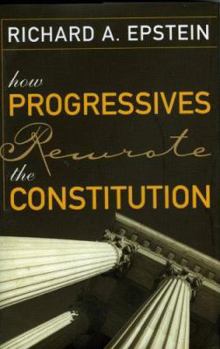How Progressives Rewrote the Constitution
Select Format
Select Condition 
Book Overview
How Progressives Rewrote the Constitution explores the fundamental shift in political and economic thought of the Progressive Era and how the Supreme Court was used to transform the Constitution into... This description may be from another edition of this product.
Format:Hardcover
Language:English
ISBN:1930865872
ISBN13:9781930865877
Release Date:January 2006
Publisher:Cato Institute
Length:156 Pages
Weight:2.40 lbs.
Dimensions:0.7" x 6.8" x 7.3"
Customer Reviews
5 ratings
Crystallizes where the U.S. went wrong like no other book
Published by Thriftbooks.com User , 15 years ago
This is an amazing synthesis of the history of the Judicial revolution, how and why it happened, and the major players and cases involved. I highly recommend it, especially to the first-year law student in connection with their Constitutional Law studies.
De-bunking the Negative Attitude Towards "Turning Back the Clock"
Published by Thriftbooks.com User , 15 years ago
Professor Epstein hit another one out of the park with this book. He firmly and clearly gives a good, but brief overview of the time periods in which the Constitution completely departed from its origional intent and boundaries for the destructive benevolence of the Supreme Court. He does a good job at differentiating between what is classical liberalism and what is staunch libertarianism. He laid out the facts showing that for example, child labor sharply fell from 1900-1930 while incomes sharply increased during the same time period, of which was all before any child labor laws or wage laws even existed. He has the intelligence to really show how "turning back the clock" by re-opening old wounds is what we should do not only for our benefit, but also to get back to following our governing document, the Constitution. His work is so well informed and argued that it is unfortunate not enough people know who he is.
Great concise review of judical history.
Published by Thriftbooks.com User , 15 years ago
I read this book in about four hours today. I realy agree with his definision of classical liberalism that is government sets up a framework of secuity in which people gain more freedoms through security. There is diferation between progressive liberal and liberitarian. I would hope more people would read this book to understand how many liberties have been lost. There are so many good points on how the progressive way of thinking has not been enlightened or successful. We as a country are still in the progressive mindset of the courts and we have not so much changed the rulings from progressive courts but overcome them. This book is not highly parizant or overly critical and should be read by people who migh not agree with the premise of the book that the constution has had significat changes and meaning have been changed of kep part over the last 70 or so years. I would higly encourage anyone who is interested in government or politics to read this book. I would recoment that those on the left atleast consider the arguments put forth and the results that are documented here.
Could've Been a Home Run...
Published by Thriftbooks.com User , 17 years ago
Having extensively studied Con Law, I was already aware of the "rewriting" of our constitution. There's an absolute gold mine of case law to support this notion. I feel like Epstein didn't make the best use of this treasure trove however. At times it seemed almost like Epstein was going easy on the Supreme Court. I think he focuses too heavily on economic theory and not enough on constitutional originalism. The title of his book is "How Progressives Rewrote the Constitution" but sometimes the content seemed more like "Why Progressive Economic Theory is Worse Than Classic Liberalism." He tries to reconcile this discrepancy by asserting that the constitution IS classically liberal. He doesn't make much of an effort, however, to sell this point. Of course, realistically this book is most likely just preaching to the choir that bought that premise long ago. I still felt he needed to (and having read other pieces from him and having seen him speak I have no doubt he could have) expounded on this foundation of his argument. As a random complaint, he spends a lot of time distinguishing libertarians from classic liberals. Given the greater conflict at hand (i.e. liberalism vs. progressivism), I found it odd that he would devote so much space to this topic.
An Excellent Review of Judicial History
Published by Thriftbooks.com User , 18 years ago
Because the political philosophy of our fathers is rooted in a combination of Lockean and Hobbesian philosophy, the initial Federal government's role was basically defense, foreign policy, and refereeing interstate commerce. It was not to provide for needs such as retirement, health, food assistance, farm support, or recreation. Yet, today the federal government is involved in all these activities, and over time, individual property rights have been highly compromised, and personal responsibility is no longer an legally binding. This book gives us a judicial history of the key court cases that lead to this outcome. It then critiques the logical flaws of the progressive thinking. It does not explain how the key judges who decided these key court cases got to the bench. Therefore, one should not and cannot rely solely on this book to give one a complete understanding how political power shifted in this country so that the vision of our founders could be destroyed. It is perhaps good that this book is not comprehensive because it would be much longer and we can use our time more efficiently by first examining the court decisions and then later one try to figure out how the court changed its guiding philosophy. I recommend this book to those who are trying to restore liberal principals to American Federalism. (Please note that liberal here begins with a small l.





